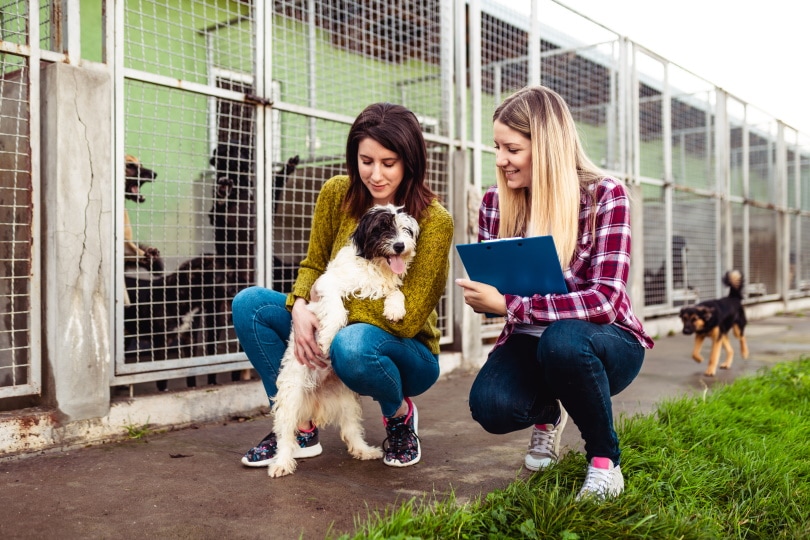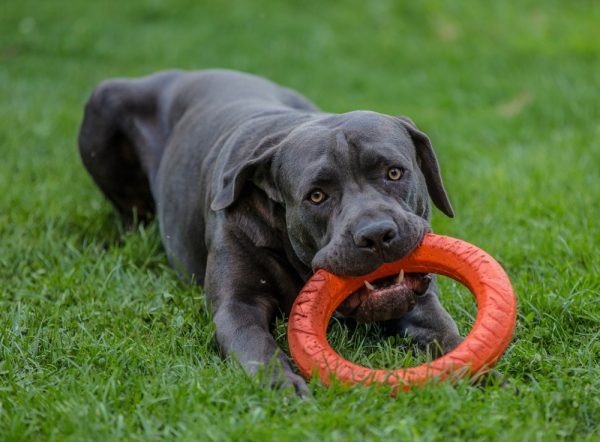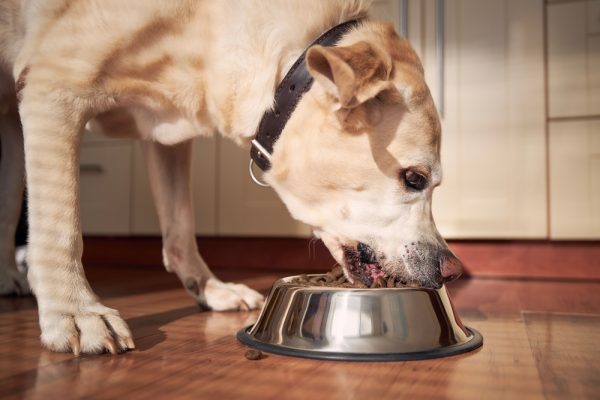Adopting a dog is a wonderful thing to do. It can save that dog’s life and provide it with a loving, forever home, while also making room for the shelter to take in another dog in need. It’s also less expensive than buying from a breeder. But, unless you’re lucky, you’ll find it difficult to adopt a puppy. Puppies tend to have long waiting lists and are much more difficult to find in shelters. As such, you will be more likely to find adult dogs.
Before taking any dog home from a rescue, there are some questions you should ask to try and understand as much as possible about your potential new family member.

The 20 Questions to Ask Before Adopting a Dog from a Shelter
1. How Long Have They Been There?
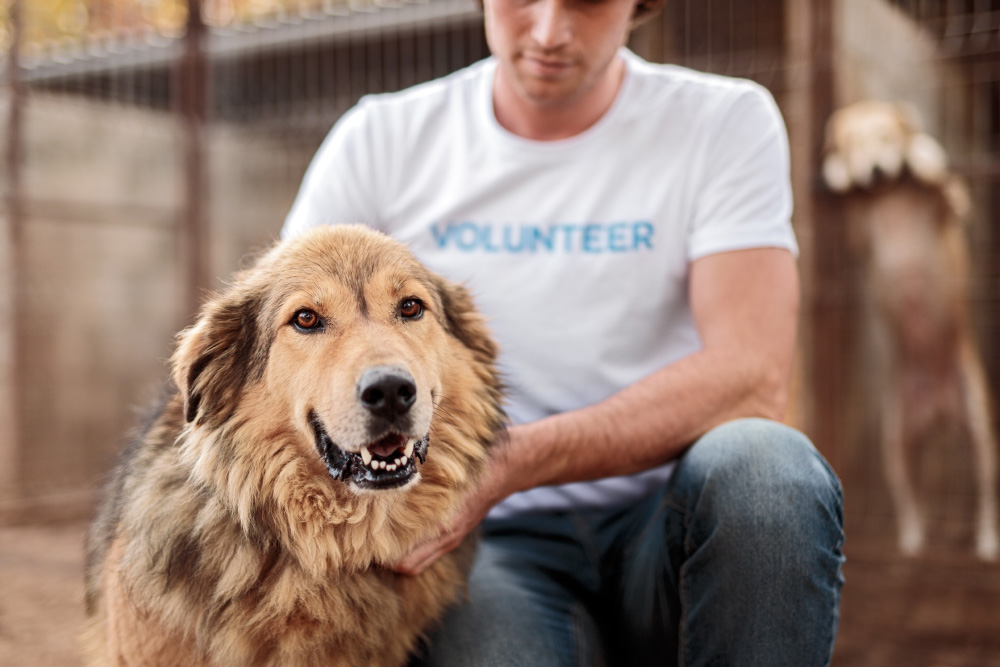
A rescue center may not be able to give accurate or reliable information regarding a dog’s full history, but they will know how long the dog has been with them. It can be difficult to rehabilitate a dog that has been in a shelter for years, but it is still possible that they will become a loving and well-rounded member of your family.
2. How Old Are They?
If the dog was relinquished, the shelter might be able to indicate age. If the dog has seen a vet since getting to the shelter, they might have been able to estimate the dog’s age. However, if there is no other information, a vet will usually look at their teeth, eyes, or coat to help determine their age.
These can be unreliable, especially if the dog has not been well looked after in the past.
3. How Many Homes Have They Lived In?
Just because a dog has been bounced from one home to the next doesn’t necessarily mean it’s the dog’s fault. This is one question where the rescue might not have an answer or might only be able to give you the information they have received.
Some people give dishonest answers when relinquishing their dog for fear that the rescue won’t take them.
4. How Are They with the Other Dogs?

The rescue should have a good idea of how the dog reacts and interacts with other dogs. Even if all the pups get walked individually, most rescues will test dogs with others, so they know whether to rehome to a family with dogs or not.
5. How Are They with Visitors?
The dog will have interacted with volunteers and potentially vets and other professionals. They will likely have met other potential adopters, too. The rescue should have a good idea of how their dogs interact with people.
This is information that you will need to know. Have they met any children? Are they good with men and women?
6. What Are They Like on a Leash?
How well a dog behaves on a leash can be an indication of how well the dog was exercised and trained before it was relinquished. And if the dog is large, you may need to know whether it is well-behaved while it has a leash on. The rescue likely exercises the dog every day.
Even if they have a paddock or field that they let the dogs freely exercise in, they most likely use leashes to walk them to the exercise area, when they are being seen by vets, and when prospective adopters want to meet the dogs.
7. Do They Enjoy Walking?

Some dogs love to walk, others prefer to lounge around at home. The same is true of owners. If you’re looking for a sedate dog that really only needs a short walk or two to do their business, you don’t want to end up with a Collie that can run all day. If you want a dog to take out on outdoor adventures, you don’t want a couch potato.
A shelter dog will likely enjoy getting out for a walk more than it will when it’s in its new home because it is fresh air and a break from its confines, but the rescue staff should be able to recognize whether a dog is active or not.
8. Do They Like to Play?
A dog’s behavior can change when it is in a shelter. A shelter represents unusual surroundings for most dogs, which can cause anxiety and stress in a lot of pups. As such, a playful dog might lose its playful instinct, but this isn’t true in all cases. Ask the shelter staff if the dog you’re interested in enjoys playing.
9. Do They Have a Favorite Type of Toy?
If they do enjoy playing, do they have a favorite toy or type of toy? If you decide to adopt the dog, getting toys ready is a good way to help ensure your new pup settles in well when they get home.
10. What History Does the Shelter Have?
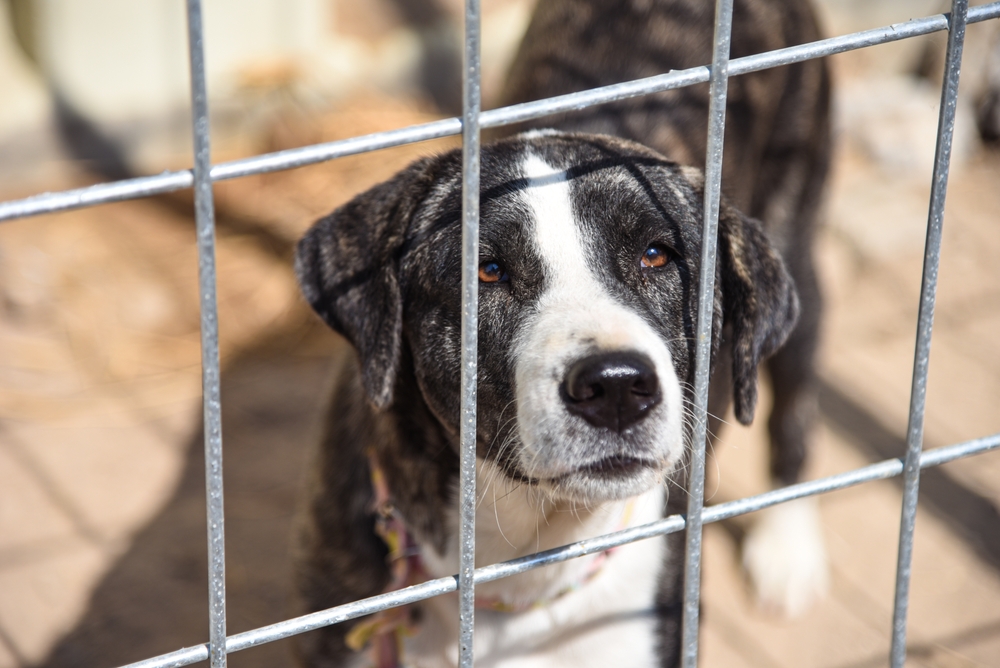
Some rescue dogs are just abandoned with no information given to the shelter, and some former owners do not give the most reliable information but ask the rescue what history they do have. This information can give some insight into the type of dog you’re considering taking home. At the very least, they will usually have some information on the reason the dog is in the shelter and why the previous owners say they gave it up.
11. Have They Been Neutered?
In the vast majority of cases, rescue dogs are spayed or neutered when they are adopted by their new owners. Shelters do this because it helps reduce the population of unwanted pets that will likely end up in shelters themselves.
Where this isn’t the case, a shelter may make it a stipulation of adoption that the dog is neutered or spayed within a certain period after the adoption.
12. Are They Microchipped?
Microchipping laws vary by state, but some states do dictate that dogs over a certain age are microchipped. If this is the case, the rescue center should ensure that a dog is chipped before it is rehomed. As with neutering, most shelters will have dogs chipped as standard and pass on the new owner’s details to the database.
But this might not always be the case, so ask the shelter whether the dog has been microchipped and how you go about changing the chip registration details.
13. Do They Have Any Known Health Issues?

Whether from information provided by previous owners or through veterinary investigation, the shelter might know some of the dog’s medical history, which is important information for you.
Some health problems can persist throughout a dog’s life or resurface after some time, which may mean extra care and costs, which you need to know about before taking the dog on.
14. Have They Seen a Vet?
Some rescues have vets come and give animals a quick check-over, but this isn’t the case with all centers. The dogs might not see a vet unless they are ill, or the rescue is particularly worried about that dog. Ask whether the dog you’re interested in has seen a vet and what the vet had to say about their general condition.
15. How Is Their Mobility?
Dogs’ joints can deteriorate with age and older dogs may lose mobility as they age. Certain hereditary conditions like elbow and hip dysplasia can cause mobility issues, though, and these tend to attract substantial healthcare costs over the dog’s life.
See how the dog moves when you visit and ask the rescue how they are in the mornings, in the cold, and generally when they move around.
16. Do They Eat Well?

Shelters are stressful environments and stress can lead to some dogs eating more or less than they normally would. Ask how well the dog eats, for its size, and whether it has any special dietary requirements or if it is a picky eater.
This will prove useful information when you get the dog home and need to buy the food yourself while also giving an indication of the dog’s general well-being.
17. How Much Exercise Do They Need?
All dogs need exercise. Some small, toy breeds may only need 30 to 45 minutes of general walks a day, but some other breeds need 60 to 90 minutes a day as well as other forms of more strenuous exercise.
The rescue might not know the exact DNA markup of the dog’s breed but will have a good idea of how much exercise you will need to commit to when you get your new dog home. Make sure this aligns with the amount of exercise you can provide or are willing to give them through dog walking services and other types of exercise.
18. Does The Shelter Know If They’re House Trained?
Dogs don’t always show house training when they’re in a shelter. They might pee and poop whenever, depending on their routines. It can take a little while for them to settle back into a routine of only toileting outside, but you can ask the shelter if they know whether the dog has a history of being house-trained or not.
They may have sent the dog out to a foster home or have a good history from the previous owner.
19. Do They Need a Garden?

While dogs do benefit from having their own outdoor space, some breeds and individual dogs are well suited to life in an apartment. These tend to be smaller dogs that don’t make too much noise because they require less exercise and won’t annoy the neighbors, while their smaller size means they can still move around freely in a smaller area.
20. Have They Ever Lived with Children?
If you have children, or you have young family or friends visiting, you need to know whether the dog you take home is good with kids. The shelter might not have first-hand experience of this unless previous prospective owners have had the dog meet their children or if the dog was relinquished because it didn’t like kids.
If you’re unsure, it is best to consider a different dog rather than risk taking one home that might not be great with young children.

Conclusion
There are a lot of factors to take into account when considering taking on any dog, especially when you’re thinking of adopting. Consider your living and personal circumstances and be realistic about the time you can dedicate to a new pup. Get as much information from the rescue center as possible and remember that they likely won’t have a full background of the dog or all the information you need.
Meet the dog several times, take them out for walks, and assess their suitability as a canine companion for you and your family. Just because you fall in love with a dog at a rescue, though, doesn’t mean you should overlook any potential problems.
- You might also be interested in: Adopt a Ryan Reynolds? Rescue Shelter Renames Pets to Boost Adoptions on Actor’s Birthday
Featured Image Credit: hedgehog94, Shutterstock

